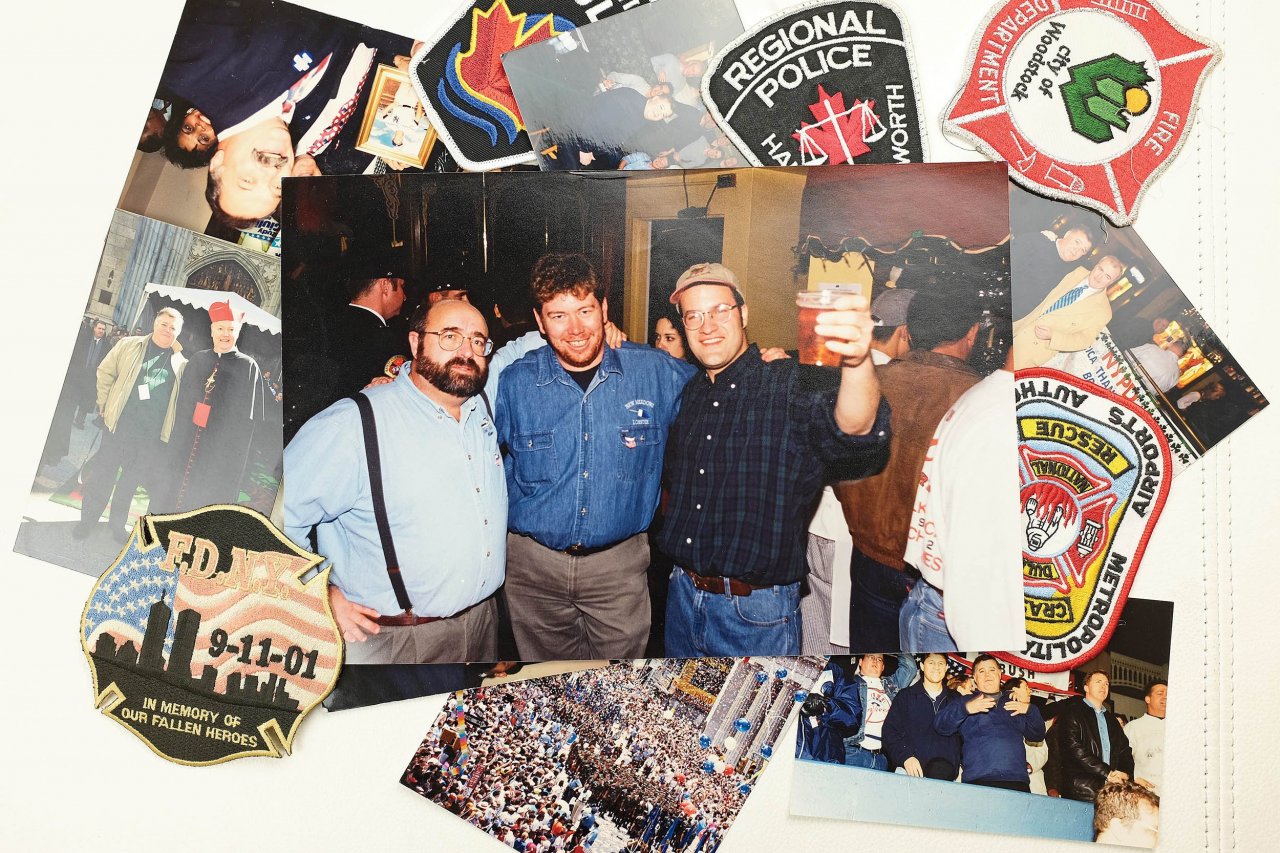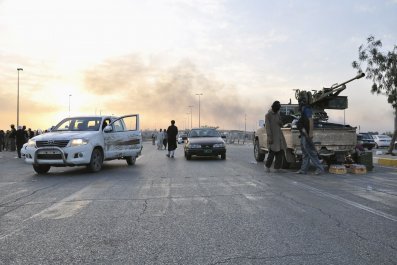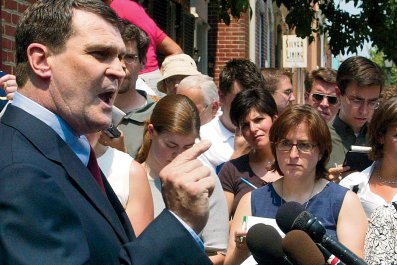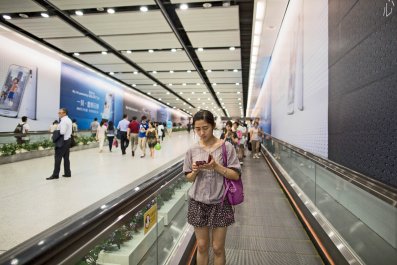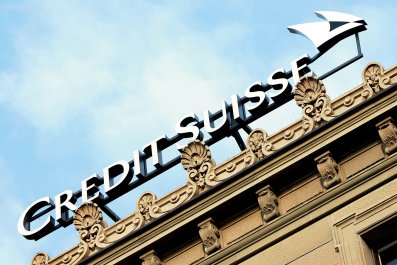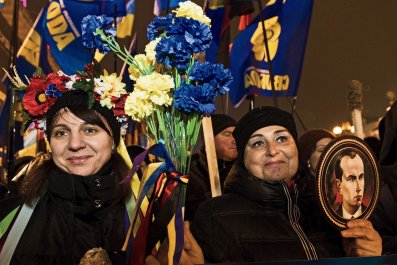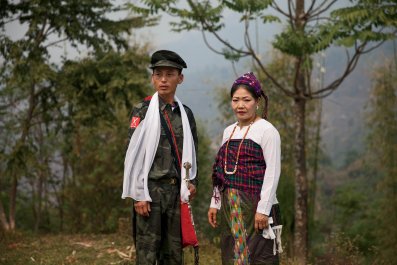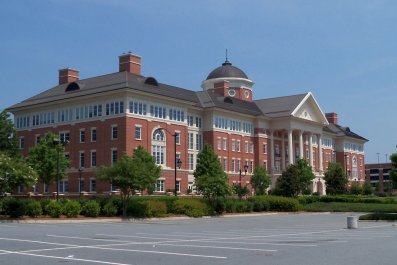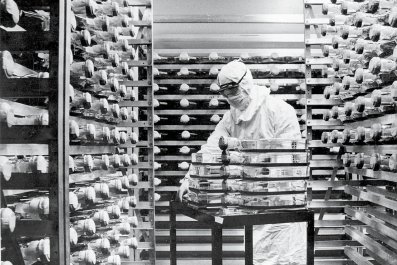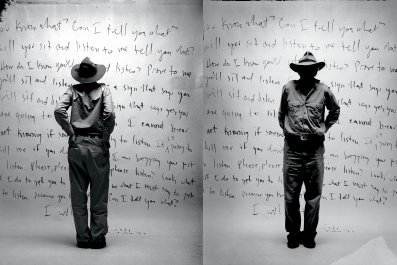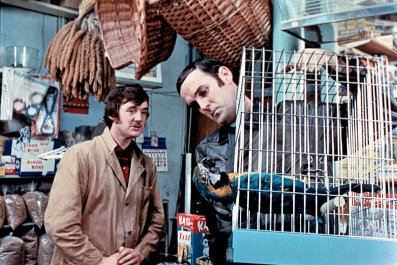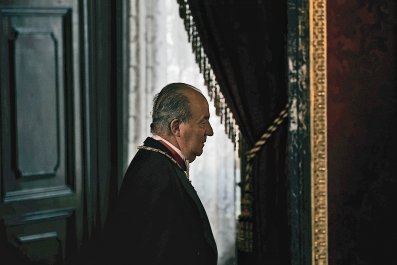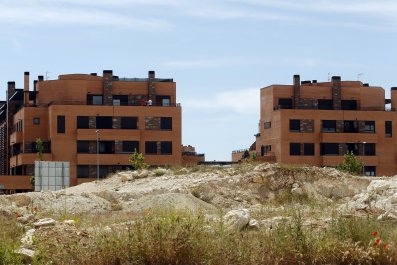It's May 29. A line of former cooks, managers, owners and a few regulars at Suspenders—a basement bar only blocks away from the World Trade Center—are loading boxes of booze and framed photographs of firefighters into the trunk of co-owner Billy Ahearn's car. In the months after 9/11, the bar served as a shelter for rescue workers, a free mess hall for tired volunteers and a dispatch center for funeral bagpipers from around the country. But, after the towers fell, business never quite recovered. Regulars were killed. Wall Street firms moved to Midtown. The recession hit in 2008. "We made money for 13 years," Ahearn says through his white mustache, before placing a photo of a firefighter in his trunk. "And then didn't make a dime in the next 13."
Suspenders is a London-style bar that, for almost three decades, has occupied the basement of an old stone building on the corner of Broadway and Thames, where it shares an underground entrance with the subway. "I liked coming here," says a regular named Jim, who stopped over to say goodbye. "It was easy to give directions to my friends when they're drunk." Suspenders's side door, the preferred entrance for regulars, is protected by an iron gate that will now be permanently locked, sealing off one of the last remaining local bars in Manhattan that was heavily involved in the 9/11 rescue effort.
As Ahearn and his friends disassemble the bar, Jim, who has been coming since before the towers fell, takes stock of the day. Like many regulars, Jim worked in the World Trade Center in 2001. At the time of the attack, he happened to be driving on the Long Island Expressway. "Weather like today, with blue skies, it still makes me uneasy," he says, adding, "It's a sad day in Mudville."
Inside the bar, co-owner Pete Galindo is chomping on a cigar as workers stack chairs and tables around him. On the walls are backlit stained-glass windows depicting, among several scenes, one of Galindo in a suit, drinking highballs with his regulars. Here too, he has a cigar. Leafing through stacks of funeral cards, patches and photographs he collected in the months after 9/11, Galindo sighs. "Do you ever feel used and tossed?" he says to no one in particular.
Most of Suspenders's regular customers disappeared on 9/11. Galindo and Ahearn lost 70 percent of their house accounts. They've never bothered to add up how much this cost them—"the least you can do is shut up about money," Ahearn says—but when pushed for an estimate they put it at tens of thousands of dollars. Galindo remembers one regular who died in the towers, asking for more time to pay his bill: "'Aw, come on, Pete,' he says, 'I got this chick. Give me another week.' I said, 'All right'—cause what are you gonna do? Then he died. That was hard. It was a family place. The boys were down with me." He tears up and laughs. "You see how easy it is to stir it up?"
It is not lost on Galindo and Ahearn that, just as business is failing, there are tourists down the street now flocking to the $700 million National September 11 Memorial & Museum, which opened a few days earlier. Visitors spend $24 to walk through some of the wreckage from 9/11 and, in some cases, purchase mugs, T-shirts, toy fire trucks and police cars and (until it was pulled from the gift shop) a commemorative United States–shaped cheese plate with heart-shaped markers denoting where the planes went down.
"This bar was part of 9/11," Galindo says. "So many people experienced it through here. But you forget too soon."
For all but its most loyal regulars—those who weren't killed in the attack—Suspenders, he says, has become just a "passing thought," putting him in the unfortunate position of having to leave without anyone left to say goodbye to. "I feel like Jimmy Durante," he says, pulling his cigar from his mouth. "You know Jimmy Durante's last lines?" (I didn't, but Durante was a New York radio show host in the 1930s and 1940s). "He'd say, 'Goodnight, Mrs. Calabash.' But nobody ever knew who Mrs. Calabash was."
"What I miss most is the people. I loved talking to them," Ahearn says.
Paging through a stack of old photographs, Galindo adds, "You get these stories," of volunteers, of customers killed in the towers, and of the human friendships and nonsense that once filled the neighborhood bar rooms of downtown Manhattan before 9/11. "I don't want to lose them."
When the towers fell on September 11, 2001, Galindo and Ahearn were home in Brooklyn and Queens respectively—but only by chance. They were scheduled to be at the World Trade Center that day to participate in "Dine Around Downtown," an event aimed at drumming up business in the towers for local bars and restaurants, but the event had been rescheduled for the next day after the organizers realized there was a voting primary in the city. "We would have been up there," Ahearn says.
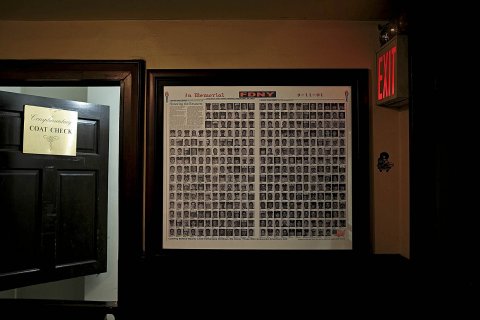
The next week, they came to Suspenders, near Ground Zero, into the red zone where no businesses were allowed to operate, and broke a city lock off the door. "It was like Vietnam," Ahearn, a veteran and former New York City fireman, recalls. When he came across a group of kids who had driven up the night before to help sift through the wreckage, he asked where they were staying. They told him they slept on the sidewalk. "C'mon," he told them. "I got a place for you to sleep." In the next few weeks, the bar became a sort of canteen for rescue workers, victims families and firefighters.
"Ironworkers came from all over the country," says Galindo. "They'd sleep in this backroom." At times, he recalls, as many as 15 workers would spend the night. He'd simply lock up and go home, not particularly worried about anyone taking anything, mainly because everyone had come to give, but also because everything—the beers, the burgers—at this point in this "strange place," as he calls it, was free. "It went on like that for about six months."
Among those to wind up at Suspenders and offer support, there were college kids, musicians, clowns and firemen. One group, a union from Portland, Maine, brought 15,000 lobsters to feed the rescue workers. There was also the group that brought gumbo from New Orleans. "We called 'em the gumbo crew," Ahearn said. They cooked it up and loaded it and Suspenders's waitstaff onto fire trucks to bring to the local firehouses. "I was a firefighter before I was a restaurant owner," says Ahearn. "So that had to come first."
Galindo recalls a firefighter who came down from Canada to volunteer. "He had this pin, a Maltese Cross. He takes the pin off and gives it to me. I never wear a sport coat without it. I wear it to this day. I tell my wife, 'When I'm in the box, make sure this pin is on my lapel.'"
There were also the endless groups of bagpipers who came to fill the overwhelming demand for "Going Home" at firefighter and police funerals. "What happened was, there weren't enough people to go to all the wakes," Galindo says. "Six a day. You had to have a lot of people volunteering, working the pile, going to cemeteries. It just went on and on." That fall, Galindo went to 27 funerals; Ahearn went to 35.
"Steven Bates," Galindo says, "his was the toughest. He had no family at all." His funeral was held at a small church in Queens packed with friends and firefighters. "Then Giuliani came in." For this kindness, Galindo later gave former mayor Rudy Giuliani an autographed picture of Mickey Mantle when he visited the bar.
At night, when its patrons weren't working at Ground Zero or attending wakes and funerals, Suspenders reverted back into the neighborhood bar it had been only months before. Volunteers and regulars did karaoke, occasionally drank far too much, and stood up on the bar giving drunken soliloquies or singing the national anthem. "They were good people," Galindo says, thinking back on that time. In a way, he adds, despite all the disaster—or perhaps because of it—"it really was a nice place." All the local spots were.
Down the street from Suspenders, a block or so from the new World Trade Center, across the street from the Liberty souvenir shop, is O'Hara's, a 31-year-old Irish pub that was almost completely destroyed when the north tower fell. Inside, thousands of patches from firefighters and rescue workers who have visited over the years line the walls.
One of O'Hara's owners, Mike Keane, worked there in one role or another since the beginning, in 1983. "Before 9/11 it was all Wall Street. You didn't have any tourists down here," he recalls, interrupted by the occasional regular stopping by for a handshake. "Now nobody's drinking at lunch. But when I started everyone was drinking scotch. Looking at it, it was pretty ridiculous. We had the commodity exchange guys over here. Those guys—they would party. You used to have 50,000 people [in the towers]. They'd be in four or five times a week. Now that culture is gone."
Keane was in O'Hara's along with five other employees when the first tower collapsed. The windows blew out from the frame and instantly, he says, they were covered head to toe in dust. The cleanup to follow would take almost a year: It would be January before their electricity returned, and another six months after that before they opened. Many of his regular customers, he discovered, had been killed. "There were so many people," he says, shaking his head. "Like Jeff. He came in every night. You just knew his first name." He sighs. "And then he didn't come in anymore." Sometimes, he'd get a call from a family member asking if he'd seen this or that person who had disappeared and whose family knew they were once a regular. Often, he hadn't.
After O'Hara's reopened, "it was a mess down here," Keane says. The nearby firefighters memorial, which opened in 2003, would pass along tourists. "They would send us business to keep us going," he says.
O'Hara's, Suspenders, and other neighborhood bars, would help each other out: "He runs out of ice? I have ice. I need a bottle of scotch? He has scotch," Galindo recalls. "But that's over."
"We were lucky," says Keane. Many of the neighborhood's longtime spots never recovered.
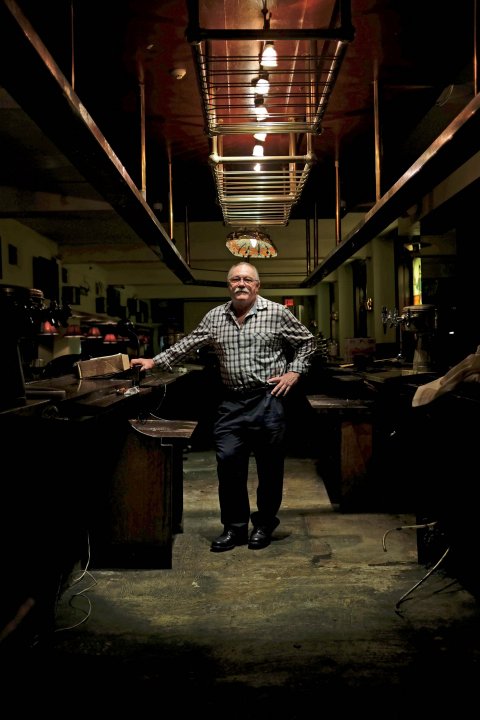
There was, for example, Moran's, a church converted into a bar that, similar to Suspenders, served as a local dispatch center and meeting point for rescue workers during 9/11. A 72-year-old former regular, Brian, remembered Moran's fondly. "It was the perfect bar. God looks down on you as you're getting drunk."
"Moran's was famous for going to Aer Lingus at the airport to hire bar girls," Brian says. "It was an Irish bar. It needed Irish girls."
It was at Moran's that Brian met his longtime friend, Stu, who is also 72. Back in the early 1990s (neither can remember exactly when) the two were each drinking alone at the bar when the bartender said "you're both in here alone all the time. Why don't you sit together?" Three decades later, they're still eating together, now at a steel-topped hotel bar on the spot where their onetime haunt St. Charlie's used to stand before 9/11. "We're refugees," they often say.
Stu works on Wall Street, but is in a perpetual state of retirement. So far, he has had three retirement parties. "I attended one," Brian says. "At Moran's. It was beautiful." Though they have met each day for years in the neighborhood bars, neither possesses each other's contact information. They dispute the exact reason for this but are seemingly uninterested in exchanging it.
Sitting at the bar, Brian remembers the 1993 bombing of the Trade Center, when attackers parked an explosive-filled truck in the basement parking garage of the towers. When the explosion happened, Brian was in Tall Ships, an old wood-paneled bar that used to sit between the two towers. He recalls ordering a hamburger when, suddenly, "there was a tremendous noise. The manager, Bobby, runs in. 'Get out! Get out!' So I grab my hamburger and leave. I go straight to the next bar and watch the whole thing on TV with everyone else. That's the beauty of New York. Anywhere else, everyone would evacuate if a building was bombed. But New Yorkers just move to the next goddamn bar and watch the whole thing on TV." Months after the bombing, Brian returned to Tall Ships for the first time. "Bobby presented me with my check for the burger. I thought, 'That's beautiful, Bobby. This is the greatest city in the world.'"
Tall Ships was, of course, destroyed in 9/11.
Neither Brian nor Stu has any plans to visit the memorial museum. Like many of lower Manhattan's remaining regulars, it's not out of protest, exactly, but a sense that the museum isn't for them. Brian tells a story: There was a woman walking home from work past the 9/11 wreckage. "Tourists stopped her, they wanted to get a picture of her. They told her to 'look sad.' It's one of the reasons tourists drive me mad. They take pictures of things they shouldn't be taking pictures of."
A common refrain is that the museum is crafted for those who experienced the tragedy from far away, through television sets and newspaper headlines; not for those who lived it. For many regulars, there is a disconnect between the national and local narratives of what, exactly, occurred and changed on that day. Asked why he didn't intend to visit the memorial, Galindo says, "Why would I? It happened here. I touched everything in there."
For the outsider, the loss of a local bar is hard to measure. A few days after Suspenders closed for business, Ahearn was behind his bar, passing out paper coffee cups filled with red wine to his wife, employees, and a few loyal regulars who continue to show up out of stubborn, hopeless, habit. "I made some very, very good friends here," one regular says. "I have friends I don't see outside of here that I always considered true friends. But places like this are disappearing. It's so sad."
Today, there was some good news. Two employees were planning to buy up the stoves, TVs, wooden bar, tables, chairs, glasses, stools and salt and pepper shakers that, for 26 years, constituted their neighborhood bar. If possible, they'd try to reopen Suspenders somewhere else in the neighborhood. But Ahearn and Galindo weren't sure whether they'd be involved. There was a sense that their regulars were gone. "It's heartbreaking to walk around," says Ahearn. Every place has a story: "Brooks Brothers was a morgue. Winter Garden was a morgue." Suspenders was a canteen, a dispatch, and many other things no one today in the disassembled bar seems quite capable of articulating.
"Billy and his bar were inseparable," says Olesya Reyenger, who, six years ago, wandered in "completely by accident" shortly after arriving from Russia, and was now a manager. "Since my family is not in this country these people have been like my family. This restaurant feels like home to me. Billy has been so much more than a boss. He respects people before he meets them. It's an infinite unconditional respect."
(By all observation, this extends to reporters: One afternoon, talking with Ahearn, he mentioned the Vietnam Memorial Wall in Washington, D.C. I commented that my father's name had been omitted from the wall because he died from Agent Orange years after the war. A few days later, unprompted, I received an e-mail from Ahearn: "I emailed a lady whose husband's name was added to the new section last year. I'll try to get the information about how she did that.")
In the backroom of the bar, Galindo packs his pile of photographs and rescue badges from 9/11 back into an envelope. He snuffs out his cigar. "This is the last statement of closure," he says of his closing bar. "It's the end of the stories."
Later, however, at the nearby steel-top bar a few blocks from Suspenders, Stu told me one more: "One time years ago I went to Suspenders," he says. "So I sat there. I order lunch. This guy next to me, a young guy—no offense—he's doing shots. He misses. He splatters me. So I say to the bartender, 'What the fuck is going on here? You need a raincoat to drink at this place.' The bartender says to me, 'Sorry, pal, but he's a regular.'"
An earlier version misspelled the name of Suspenders co-owner Pete Galindo. Steven Bates name was also mispelled, and the article was corrected to say his funeral was well-attended.



